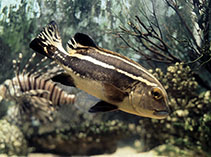| Family: |
Haemulidae (Grunts), subfamily: Plectorhinchinae |
| Max. size: |
100 cm SL (male/unsexed) |
| Environment: |
reef-associated; brackish; marine; depth range 2 - 50 m |
| Distribution: |
Indo-West Pacific: Red Sea and Madagascar to Fiji and Micronesia; north to Ryukyu andn south to the Great Barrier Reef and New Caledonia. |
| Diagnosis: |
Dorsal spines (total): 13-13; Dorsal soft rays (total): 17-18; Anal spines: 3-3; Anal soft rays: 7-7. Description: Juveniles become somewhat deeper-bodied with growth and at a size of 14-16 cm, loose the lower stripe and develop a cream-colored belly (Ref. 37816). Described from a 10-cm juvenile which is orange with broad black stripes, one running mid-laterally and the other along upper two-thirds of sides, with narrow yellow stripe in between, ventrally whitish to orange; caudal fin with alternating bands black and orange. Adults mainly grey with white speckles; fins spinous dorsal yellow, soft dorsal broad black on anterior, pelvic and anal black, caudal spotted small and large, black (Ref. 48635, 90102). Lips very thick. Body depth 2.5-3.2 in SL. Dorsal 3rd to 5th spines longest. Caudal fin rounded in juveniles becoming emarginate in adults. |
| Biology: |
Found in clear lagoon and seaward reefs. Juveniles in brackish habitats or shallow turbid coastal areas (Ref. 9710). Adults usually solitary, occasionally in pairs; on deep reefs or with sea mounts (Ref. 48635). At Palau, aggregates to spawn about once a year around new moon of April or May (Ref. 37816). |
| IUCN Red List Status: |
Least Concern (LC); Date assessed: 12 April 2023 Ref. (130435)
|
| Threat to humans: |
harmless |
Source and more info: www.fishbase.org. For personal, classroom, and other internal use only. Not for publication.
